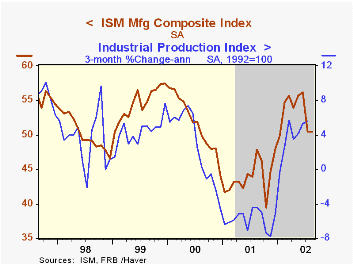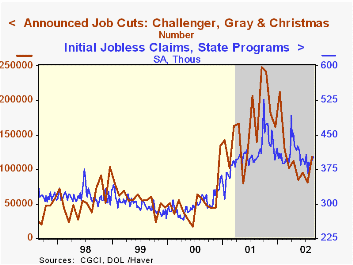 Global| Sep 03 2002
Global| Sep 03 2002ISM Index Unchanged in August
by:Tom Moeller
|in:Economy in Brief
Summary
The ISM Composite Index of manufacturing sector activity was slightly weaker than expected last month, unchanged from July at 50.5. Consensus expectations were for a modest rise to 51.7. New orders, production and the vendor [...]

The ISM Composite Index of manufacturing sector activity was slightly weaker than expected last month, unchanged from July at 50.5. Consensus expectations were for a modest rise to 51.7.
New orders, production and the vendor performance indexes all fell. Employment and inventories rose.
Inflation pressure fell for the first month since February. The percentage (NSA) of companies reporting higher prices fell to the lowest level since March.
Over the last twenty years there has been a 76% correlation between the ISM Composite Index and the three month change in industrial production.
| ISM Manufacturing Survey | Aug | July | Y/Y | 2001 | 2000 | 1999 |
|---|---|---|---|---|---|---|
| Composite Index | 50.5 | 50.5 | 47.9 | 43.9 | 51.6 | 54.6 |
| Prices Paid Index | 61.5 | 68.3 | 35.0 | 43.0 | 64.8 | 54.2 |
by Tom Moeller September 3, 2002

According to Challenger, Gray & Christmas, announced job cuts surged in August to the highest level since February.
Announced job cuts were widespread amongst industries.
During the last eight years there has been a 72% correlation between the y/y change in announced job cuts and the change in initial claims for jobless insurance.
| Challenger, Gray & Christmas | Aug | July | Y/Y | 2001 | 2000 |
|---|---|---|---|---|---|
| Announced Job Cuts | 118,067 | 80,966 | -15.7 | 1,956,876 | 613,980 |
Tom Moeller
AuthorMore in Author Profile »Prior to joining Haver Analytics in 2000, Mr. Moeller worked as the Economist at Chancellor Capital Management from 1985 to 1999. There, he developed comprehensive economic forecasts and interpreted economic data for equity and fixed income portfolio managers. Also at Chancellor, Mr. Moeller worked as an equity analyst and was responsible for researching and rating companies in the economically sensitive automobile and housing industries for investment in Chancellor’s equity portfolio. Prior to joining Chancellor, Mr. Moeller was an Economist at Citibank from 1979 to 1984. He also analyzed pricing behavior in the metals industry for the Council on Wage and Price Stability in Washington, D.C. In 1999, Mr. Moeller received the award for most accurate forecast from the Forecasters' Club of New York. From 1990 to 1992 he was President of the New York Association for Business Economists. Mr. Moeller earned an M.B.A. in Finance from Fordham University, where he graduated in 1987. He holds a Bachelor of Arts in Economics from George Washington University.
More Economy in Brief
 Global| Feb 05 2026
Global| Feb 05 2026Charts of the Week: Balanced Policy, Resilient Data and AI Narratives
by:Andrew Cates






